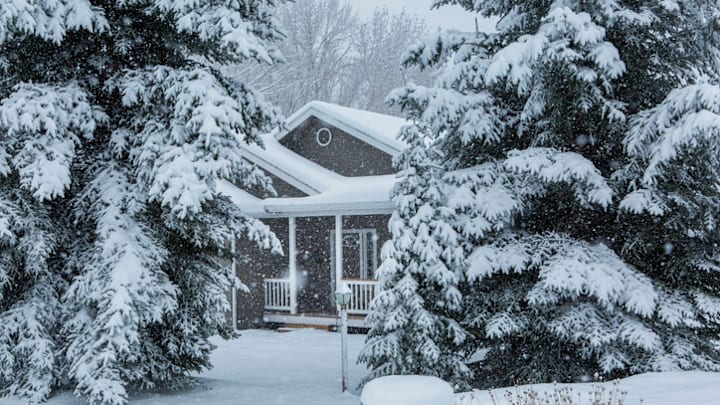Americans have no lack of idioms for snow and other features of winter weather. Here are 15 of them from all over the United States found in the Dictionary of American Regional English (DARE).
- Cat’s Track
- Skift
- Skimp
- Goose Down
- Goosefeathers
- The Old Woman Is Picking Her Geese
- Scutch
- Snow Squall
- Flour-Sifter Snow
- Corn Snow
- Hominy Snow
- Grampel
- Snirt
- Sposh
- Post-Holing
Cat’s Track
When there’s a light fall of snow, you can call it cat’s track, a term used in Maine, Massachusetts, Illinois, and Wisconsin. A resident from the Badger State says, “If there is enough snow to track a cat, there has been a snowfall.” Conversely, not much snow can be described as “not enough snow to track a cat.”
Skift
Skift refers to a light fall of snow, according to DARE, as well as a “thin layer of snow or frost on the ground, or of ice on water.” The use of the term is widespread across the U.S. except in the Northeast, South, and Southwest.
Skimp

If someone in Iowa, Kentucky, Indiana, or north-central Arkansas says, “Watch out for that skimp,” better take heed. They’re talking about a thin layer of ice or snow. Skimp can also be a verb meaning to freeze in a thin coating.
Goose Down
Get a light snow in Alabama? You can call it goose down.
Goosefeathers
In Vermont, large, soft flakes of snow might be referred to as goosefeathers.
The Old Woman Is Picking Her Geese

This colorful idiom for it’s snowing is especially used in the Appalachians, along with the old woman’s a-losin’ her feathers. Meanwhile, in Kentucky, you might hear Aunt Dinah’s picking her geese.
Scutch
Another term for a light dusting or flurry of snow, this time in Delaware. Scutch might come from scuds, a word of Scottish origin meaning ale or beer.
Snow Squall
Why say snow shower when you can say snow squall? This chiefly Northeast saying refers to “a sudden snowstorm of short duration.” Its earliest recorded usage in American English is from 1775.
Flour-Sifter Snow

The next time you’re in Montana surrounded by small-flaked snow, you can say, “We’ve got some flour-sifter snow!”
Corn Snow
You know it and you hate it: that granular, kernel-like snow that’s the result of repeated thawing and freezing. The term corn snow is used in Pennsylvania, Michigan, and Oregon.
Hominy Snow
If grits are more up your alley, there’s hominy snow, a saying native to the South Midland states. The word hominy, referring to a type of boiled ground corn, is Native American in origin, possibly coming from the Algonquian uskatahomen, “parched corn.”
Grampel

This term in northeast Washington and southwest Oregon for a snow pellet that’s “somewhat like hail” is probably a variant on graupel, “soft hail.” Graupel is German in origin and comes from graupel wetter, which translates literally as “sleet weather.”
Snirt
While it might sound like a cross between a snort and a snicker, this Upper Midwest term actually refers to a mix of windblown snow and dirt. The moniker itself is a blend too, namely of the words—you guessed it—snow and dirt.
Sposh
Back in the day, New Englanders called slush sposh, which also referred to mud. The word is probably imitative in origin and might be influenced by words like slush, slosh, and splash.
Post-Holing

Ever walk in snow so deep you sink with every step? That’s post-holing or post-holing it, a saying in Colorado, Arkansas, Montana, and northwest Massachusetts. Post here refers to a fence post and hole to the hole created to secure it in the ground. Now we just need a word for sinking up to your knee when you step off a curb into slush that you’ve mistaken for ice.
Discover More Stories About Winter Weather:
A version of this story was published in 2017; it has been updated for 2024.
